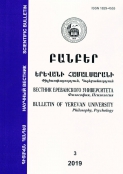THE PHILOSOPHICAL-CULTUROLOGICAL SIGNIFICANCE OF THE CONCEPTION “BORDER”
DOI:
https://doi.org/10.46991/BYSU:E/2019.10.3.026Keywords:
culture, border, meaning, cognition, dialogue, rationality, another, understanding, existence, varietyAbstract
The article asserts that the formation of borders between the natural and the artificial, one's own and another's is originally inherent to a person, who creates his own world – the world of Culture – in an incomprehensible and alien world of Nature. Initially, the border lay between nature and culture, however, due to its sense-forming function, culture became so diverse, that the border, figuratively speaking, moved to the field of culture, becoming a measure of one’s and someone else’s friend and enemy, allowed and forbidden, etc. By setting borders, culture also becomes a kind of watchman guarding his territory. The paradox of this completely natural situation is that culture protects what it does not have – the territory because the cultural sphere of living (actualization, creative being) is the border – the meeting place of at least two cultures. A dialogue also begins here, which in the modern multicultural world is a form of cultural existence. The article substantiates the idea, that the phenomenon of the border is directly related to man, because his spiritual world generally arises on the border of being and non-being, in the so-called "situation of borderline being". Non-being, in this case, appears not as Nothing, but as another , which cannot be eliminated due to the moral justification of its existence. This justifies that the integrity of human beings cannot be guaranteed by a single culture, but becomes possible only at the border of cultures, where the creative tension of the spiritual world of a person is expressed. The border becomes a measure of self-determination and at the same time, it must be overcome creatively.
Downloads
Published
Issue
Section
License
Copyright (c) 2019 Bulletin of Yerevan University

This work is licensed under a Creative Commons Attribution-NonCommercial 4.0 International License.

